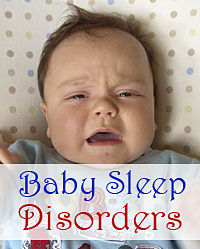 Baby sleep problems are some of the most common complaints among parents of newborns. How can you tell if your baby has the expected sleep habits, or some kind of sleep disorder? As many as 10% of parents report a baby sleep disorder in the first 12 months, and we know this is under-reported because a lot of pediatricians don’t ask about sleep problems. But it’s important to diagnose and sleep baby sleep disorders, because research shows that they’re connected to other health problems. Just look at the link between sleep apnea, cardiovascular disorders, and diabetes.
Baby sleep problems are some of the most common complaints among parents of newborns. How can you tell if your baby has the expected sleep habits, or some kind of sleep disorder? As many as 10% of parents report a baby sleep disorder in the first 12 months, and we know this is under-reported because a lot of pediatricians don’t ask about sleep problems. But it’s important to diagnose and sleep baby sleep disorders, because research shows that they’re connected to other health problems. Just look at the link between sleep apnea, cardiovascular disorders, and diabetes.
Types of Baby Sleep Disorders
To determine if your baby might have a sleep disorder, it’s important to know what baby sleep problems are normal, versus what things might cause concern. If your newborn is waking up every 2-3 hours to eat, for example, that’s normal. Welcome to parenthood! However, these persistent issues might be considered sleep disorders:
| Sleep Disorder | Description |
| Sleep onset latency | Baby has trouble going to sleep or falling asleep. This is a very common cause of baby sleep problems, and may not indicate a true disorder. Be sure to check the usual reasons a baby won’t sleep. |
| Sleep maintenance | Baby has trouble staying asleep and wakes up often. This, too, is a frequent source of parent frustration. See our article 7 reasons the baby woke up last night to learn about the common causes. |
| Sleep duration | Baby’s total sleep in a 24-hour period is not enough. Newborns should be getting 17-18 hours of sleep per day; at 6 months they should get about 16 hours, and at 12 months around 14 hours. |
| Naps or daytime sleep | Baby takes naps that are too long (less common) or too short (more common). One problem I hear about often is a newborn that sleeps in a series of short catnaps throughout the day. Learn more about baby nap problems. |
| Sleep location | Baby refuses to sleep in the crib. This is a learned behavior in most cases, and one that can be addressed by parent intervention. See our article on getting baby to sleep in the crib. |
| Restlessness/vocalization | Baby tosses and turns, fusses, or cries during normal sleep. Some amount of this is normal, but consistent restlessness may indicate that your baby isn’t getting the sleep he or she needs. |
| Snoring | This one is obvious! Occasional snoring could be due to congestion, but consistent snoring may be a sign of a more serious condition such as sleep apnea. |
| Nightmares | Baby cries during sleep or wakes up crying, but is easily comforted. It’s hard to say definitively that the cause was a nightmare, but sometimes there are no more explanations. |
| Night Terrors | A sort of “waking nightmare” in which the baby seems frightened. It’s hard to tell if a screaming baby is truly “awake” or not, so this may be easier to diagnose in slightly older children (toddlers and beyond). |
Handling Baby Sleep Disorders
If you think that your baby might have a sleep disorder, the first thing you should do is talk to your pediatrician. As many as half of pediatricians in a recent survey didn’t routinely ask parents about their baby’s sleep habits, so don’t be afraid to bring it up on your own! The more specific information you can provide, the better. Use statements like these:
- He’s taking ___ naps per day, and each is about ___ hours long.
- We put her to bed at ___ and she usually wakes up ___ times in the middle of the night.
- Our bedtime routine is ___, after which it usually takes him ___ minutes to fall asleep.
- Her longest nap or sleep stretch is during the ___, and it lasts for ___ hours.
When you provide this information, it can help your pediatrician determine if your baby’s sleep habits are on par, or if more intervention is required.
We went through this sort of thing ourselves when our older boy was about 9 months old. He’d been sleeping through the night for a couple of months, and then started waking up hungry at 4 a.m. We’d feed him a bottle of warm milk, and he’d go back to sleep until 8 or 9 a.m. It was all great except for that middle-of-the-night feeding. When we brought this up to our pediatrician, he told us that we were reinforcing our boy’s instinct to wake up.
By feeding him each time, we taught his body that it was supposed to wake up and eat at 4 a.m. Luckily, our pediatrician gave us a one week program to break ourselves of the bad habits, and it worked! That’s why you should talk to your pediatrician.
Consequences of Baby Sleep Disorders
There are good reasons to get help diagnosing and addressing your baby’s sleep disorders. Research has shown that baby sleep problems increase the likelihood of:
- Your baby’s cognitive development and memory
- Future emotional and behavior problems in the toddler years and beyond
- Maternal depression and anxiety. Obviously!
- Stress and marriage problems
Even without advice from your pediatrician, there’s lots that you can do to help address baby sleep problems. Start at our baby sleep training page and go from there!